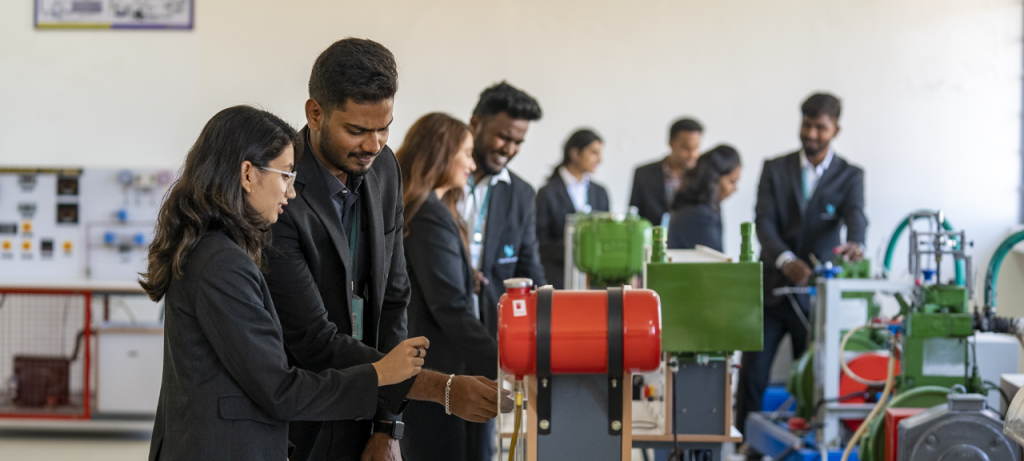FAQs
What is the duration of the B.Tech course at CMR University?
4 years
What is the admission process for the B.Tech course at CMR University?
Written test and interview
What is the eligibility criteria for the BTech course at CMR University?
10+2 with physics, chemistry, and mathematics as subjects and a minimum of 45% marks in 10+2. Other equivalent qualifications may also be considered.
Do the CST program include all the areas of computing & technology?
Yes, it almost includes all the areas of computing & technology. CMR University, one among the top Engineering colleges in Karnataka is a good choice for B.Tech in CST Program. Our course has Virtual Reality & Game-Theoretic Simulation, Data structures, Mobile application development, Data mining, Big data, Artificial intelligence, Cryptography, Digital forensics, and Data analytics, Human Computer Interaction, Augmented & Mixed Reality, Industrial Internet of Things.
Will the course help me secure a stable professional future?
B.Tech in CST is tailored such that you get hands-on project-based learning exposure to innovative entrepreneurial/technology entrepreneurial skills. Due to the unique program structure, CST graduates will be prepared to address the complexities of real-world technology issues, and to adapt to future developments in this fast-paced and dynamic world. CST Programme is best suited for you if you want to graduate with a placement offer (or) pursue higher education and setup a start-up.
What set of skills do I need to be a Computer Engineering?
Computer Science & Technology (CST) Program teaches its students skills in two areas
- Software Automation Tools
- Deployable Intelligent Applications
What job opportunities are there for Computer Engineering?
- Software Developer
- Data Scientist
- Game Designer
- IOT Developer
- Network Administrator
- System Analyst
- Technological Entrepreneurship
- Management Information Systems
- Business Analyst
What kind of facilities are available in the department of CSE at CMR University?
The department of CST at CMR University has Data structures laboratory, Labs for programming with python, Artificial Intelligence & Machine Learning Labs, a Programming with Java lab, and a Database management systems lab, Data science lab. Spacious classrooms with electronic infrastructure for audio-visual teaching aids, rapid prototyping labs, and a conference room for discussions.
What is the admission process for B.Tech in CST?
Log on to the portal from our website, download the admission form and fill it. You can either submit the form in person at the college campus or submit it online after payment of application fees. Further you will receive a call for interview if you are shortlisted.
Are computer science & technology in demand?
Yes , Computer science & technology are in high demand. With the growing automation and AI technology, there is a huge need for analysing the field of computing technology, big data and data analytics. The subject is the base of many sub-divisions in engineering which creates a huge demand for computer science technologists.
Is there any placement cell/support provided for job search?
Yes, at CMR University we have a dedicated placement cell that comprises experienced professionals from various fields of engineering to train the students to attend the placement interviews. We also help the students develop their soft skills and leadership skills from the first year through various modules.
Does the B.Tech course at CMR University offer any practical training or internship opportunities?
Yes, the B.Tech course at CMR University provides students with practical training and internship opportunities as part of the curriculum.









